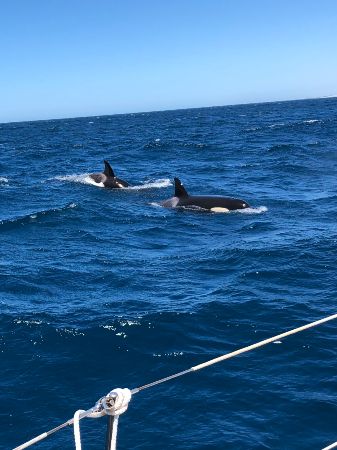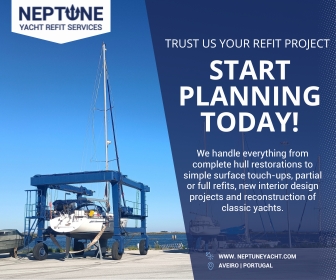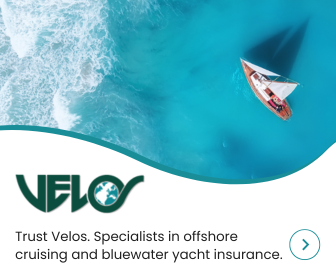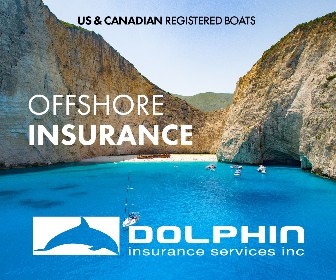Spain, Cape Trafalgar: Report on Orca Interaction and Damage
First-hand detailed report from a Jeanneau 57 that was “bumped” by orcas while motorsailing past Cape Trafalgar, northwest of the Strait of Gibraltar, on the way to the Mediterranean from the UK.
Published 4 months ago
The vessel was on delivery from Hamble (UK) to Corfu (Greece) with a delivery captain on board (Commercial Offshore Yachtmaster, with more than 40 years experience in sailing these waters) plus two other crew members. The orca interaction occurred in May 2025 at 16:00 hrs.
The Incident
The vessel (a Jeanneau 57) was motor sailing in approximately 65 meters of depth off Cape Trafalgar (N36 06.98 W005 58.443) with a SW 10-knot wind. After hearing a Mayday call from another yacht experiencing an Orca interaction 8 nautical miles ahead and closer to shore (inside the 20-meter mark), the captain decided to alter course and increase speed towards Punta Camarinal.
Approximately 30 minutes later, a lone Orca was spotted heading rapidly towards the vessel. The crew immediately dropped the mainsail, deployed sonic pingers, and engaged hard astern. The Orca struck the rudder violently three times, causing it to go hard over from stock to stock. The interaction was brief, lasting only a few minutes, with the captain believing the pingers successfully deterred the animal.
[Editor’s Note: In Spain and Portugal, current legislation does not allow the use of acoustic devices to deter orcas.]
Damages and Aftermath
Despite the violent impact, there was no visible damage to the rudder, engine, shaft, or propeller. However, the wire and chain linkage from the helm to the quadrant was damaged and there was a possible small stress fracture to the port steering pedestal. The stern thruster also ceased functioning. The crew was able to fit emergency steering gear in the form of a drop over T bar and together with use of bow and stern thrusters, this allowed the vessel to make a safe land fall in Barbate Harbour. Benign sea conditions also assisted greatly.
Helpful Marine Services in Barbate
The crew reported that the marine services in Barbate proved exceptionally helpful. The yacht was lifted onto the hard standing, a process only available on Mondays, Wednesdays, and Fridays, with the yard closing at three PM. It’s worth noting that this area is a local holiday destination, making it challenging to find English-speaking tradespeople; a good grasp of colloquial Spanish is a significant advantage.
The boatyard staff were highly cooperative and competent in all repairs and fabrication. Barbate has unfortunately become a central hub for Orca interaction repairs, boasting a deep-water harbor and an 80-tonne travel hoist. Their workers are now arguably the most experienced in dealing with rudder-related damage. Repairs to the vessel were completed competently and in a timely manner, allowing the yacht to be relaunched and the delivery to Corfu to be completed without further issues.
Thoughts from the Captain
The captain acknowledged his role in the incident, stating, “Although ultimately the Orca was responsible, I also shoulder some blame as I was in charge and decided on the route and timeframe.” This highlights the critical importance of route planning in known Orca interaction zones.


Helpful advice for sailors navigating these waters:
- Heed Warnings: Pay close attention to Mayday calls and other reports of Orca interactions in your vicinity.
- Shallow Water Preference: While this particular interaction occurred in 65 meters, the initial Mayday was inside the 20-meter contour. Current advice often suggests staying in waters shallower than 20 meters, close to shore, in known interaction hotspots, if feasible and safe for navigation.
- Preparation is Key:
- Deterrents: Review the CA Orca Project collated library of skippers’ comments on deterrent measures – www.theca.org.uk/orcas/interaction-deterrent-library
- Emergency Steering: Be intimately familiar with your emergency steering system and be prepared to deploy it quickly.
- Immediate Action During Interaction:
- Stop Movement: Drop sails and go hard astern or stop forward motion immediately.
- Disable Autopilot: This is crucial as violent rudder movements can damage steering systems.
- Hands Off the Helm: Do not attempt to steer or fight the rudder during an interaction.
- Repair Hub: Be aware that Barbate is a primary location for Orca interaction repairs, offering experienced services. Factor in their limited lift-out schedule if you need to plan a repair.
- Language Barrier: A basic understanding of Spanish will be highly beneficial when dealing with local services.
This incident underscores the unpredictable nature of Orca interactions, but also demonstrates that with preparedness and swift action, yachts can navigate these challenging encounters and successfully manage the aftermath. Stay vigilant and well-prepared out there!
Useful Atlantic Orca links
See Noonsite’s Orca and Yachts page.
…………………………………
© 2025 Noonsite. This content was edited by Noonsite. Do not reproduce without permission. All rights reserved.
The opinions expressed in this article are the author’s own and do not reflect the view of Noonsite.com or World Cruising Club.
Find out all news, reports, links and comments posted on Noonsite, plus cruising information from around the world, by subscribing to our FREE monthly newsletter. Go to https://www.noonsite.com/newsletter/.
If you have found this information useful, become a paid member to enjoy unlimited use of Noonsite plus many other perks. Your membership fees really help our small, dedicated team keep country information up-to-date in support of cruisers worldwide. Find out more about Noonsite Membership levels and benefits here.
Related to following destinations: Algeciras, Atlantic Coast (Portugal), Barbate, Cadiz, Gibraltar, Gibraltar Port, Portugal, South West Coast (Spain), Spain, Tarifa
Related to the following Cruising Resources: Atlantic Ocean East, Mediterranean, Orcas and Yachts, Routing






